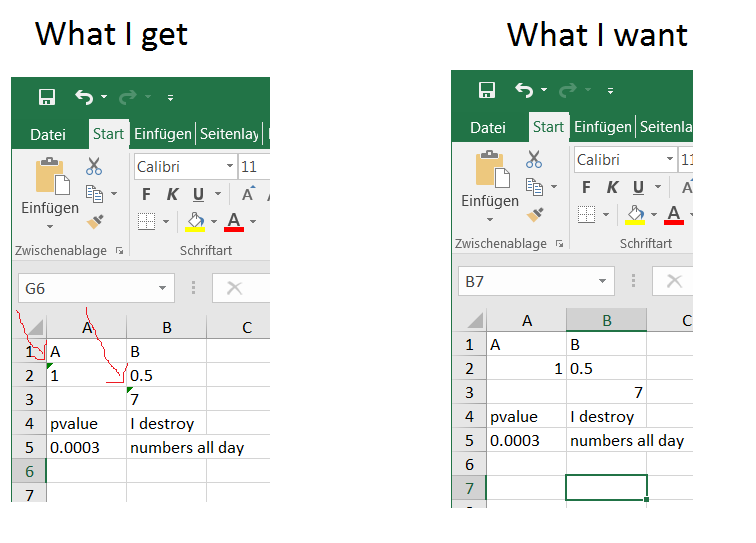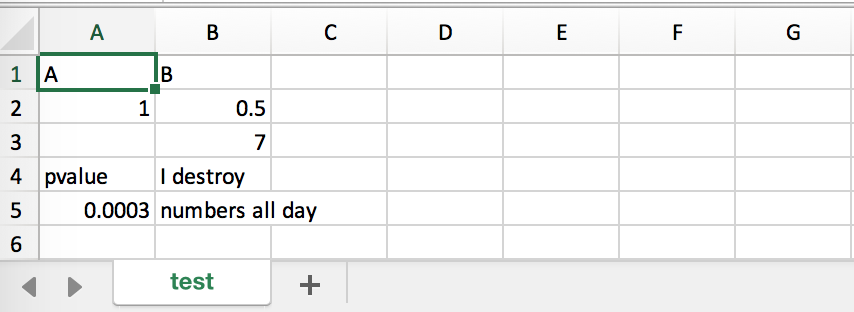thanks @mt1022 added the validator to let 000123 stay 000123 in the helpers function part
A solution that can do what openxlsx::write.xlsx() can do + "finding meaningful types".
function: (its 98% openxlsx::write.xlsx)
writeXlsxWithTypes <- function(x, file, asTable = FALSE, ...) {
library(magrittr);library(openxlsx);
if(T) {
setTypes <- function(x) {
x %<>%
lapply(function(xX){
lapply(xX ,function(u) {
if(canConvert(u)) { type.convert(as.character(u), as.is = TRUE) } else { u }
})
}) %>% do.call(cbind, .) %>% as.data.frame
} #types fun
validateBorderStyle <- function(borderStyle){
valid <- c("none", "thin", "medium", "dashed", "dotted", "thick", "double", "hair", "mediumDashed",
"dashDot", "mediumDashDot", "dashDotDot", "mediumDashDotDot", "slantDashDot")
ind <- match(tolower(borderStyle), tolower(valid))
if(any(is.na(ind)))
stop("Invalid borderStyle", call. = FALSE)
return(valid[ind])
}
validateColour <- function(colour, errorMsg = "Invalid colour!"){
## check if
if(is.null(colour))
colour = "black"
validColours <- colours()
if(any(colour %in% validColours))
colour[colour %in% validColours] <- col2hex(colour[colour %in% validColours])
if(any(!grepl("^#[A-Fa-f0-9]{6}$", colour)))
stop(errorMsg, call.=FALSE)
colour <- gsub("^#", "FF", toupper(colour))
return(colour)
}
#x="0001"
canConvert <- function(x) {
return( !grepl("^0+\\.?\\d",x) )
}
} # define helper functions
if(T) {
params <- list(...)
if (!is.logical(asTable))
stop("asTable must be a logical.")
creator <- ifelse("creator" %in% names(params), params$creator,
"")
title <- params$title
subject <- params$subject
category <- params$category
sheetName <- "Sheet 1"
if ("sheetName" %in% names(params)) {
if (any(nchar(params$sheetName) > 31))
stop("sheetName too long! Max length is 31 characters.")
sheetName <- as.character(params$sheetName)
if ("list" %in% class(x) & length(sheetName) == length(x))
names(x) <- sheetName
}
tabColour <- NULL
if ("tabColour" %in% names(params))
tabColour <- validateColour(params$tabColour, "Invalid tabColour!")
zoom <- 100
if ("zoom" %in% names(params)) {
if (is.numeric(params$zoom)) {
zoom <- params$zoom
}
else {
stop("zoom must be numeric")
}
}
gridLines <- TRUE
if ("gridLines" %in% names(params)) {
if (all(is.logical(params$gridLines))) {
gridLines <- params$gridLines
}
else {
stop("Argument gridLines must be TRUE or FALSE")
}
}
overwrite <- TRUE
if ("overwrite" %in% names(params)) {
if (is.logical(params$overwrite)) {
overwrite <- params$overwrite
}
else {
stop("Argument overwrite must be TRUE or FALSE")
}
}
withFilter <- TRUE
if ("withFilter" %in% names(params)) {
if (is.logical(params$withFilter)) {
withFilter <- params$withFilter
}
else {
stop("Argument withFilter must be TRUE or FALSE")
}
}
startRow <- 1
if ("startRow" %in% names(params)) {
if (all(startRow > 0)) {
startRow <- params$startRow
}
else {
stop("startRow must be a positive integer")
}
}
startCol <- 1
if ("startCol" %in% names(params)) {
if (all(startCol > 0)) {
startCol <- params$startCol
}
else {
stop("startCol must be a positive integer")
}
}
colNames <- TRUE
if ("colNames" %in% names(params)) {
if (is.logical(params$colNames)) {
colNames <- params$colNames
}
else {
stop("Argument colNames must be TRUE or FALSE")
}
}
if ("col.names" %in% names(params)) {
if (is.logical(params$col.names)) {
colNames <- params$col.names
}
else {
stop("Argument col.names must be TRUE or FALSE")
}
}
rowNames <- FALSE
if ("rowNames" %in% names(params)) {
if (is.logical(params$rowNames)) {
rowNames <- params$rowNames
}
else {
stop("Argument colNames must be TRUE or FALSE")
}
}
if ("row.names" %in% names(params)) {
if (is.logical(params$row.names)) {
rowNames <- params$row.names
}
else {
stop("Argument row.names must be TRUE or FALSE")
}
}
xy <- NULL
if ("xy" %in% names(params)) {
if (length(params$xy) != 2)
stop("xy parameter must have length 2")
xy <- params$xy
}
headerStyle <- NULL
if ("headerStyle" %in% names(params)) {
if (length(params$headerStyle) == 1) {
if ("Style" %in% class(params$headerStyle)) {
headerStyle <- params$headerStyle
}
else {
stop("headerStyle must be a style object.")
}
}
else {
if (all(sapply(params$headerStyle, function(x) "Style" %in%
class(x)))) {
headerStyle <- params$headerStyle
}
else {
stop("headerStyle must be a style object.")
}
}
}
borders <- NULL
if ("borders" %in% names(params)) {
borders <- tolower(params$borders)
if (!all(borders %in% c("surrounding", "rows", "columns",
"all")))
stop("Invalid borders argument")
}
borderColour <- getOption("openxlsx.borderColour", "black")
if ("borderColour" %in% names(params))
borderColour <- params$borderColour
borderStyle <- getOption("openxlsx.borderStyle", "thin")
if ("borderStyle" %in% names(params)) {
borderStyle <- validateBorderStyle(params$borderStyle)
}
keepNA <- FALSE
if ("keepNA" %in% names(params)) {
if (!"logical" %in% class(keepNA)) {
stop("keepNA must be a logical.")
}
else {
keepNA <- params$keepNA
}
}
tableStyle <- "TableStyleLight9"
if ("tableStyle" %in% names(params))
tableStyle <- params$tableStyle
colWidths <- ""
if ("colWidths" %in% names(params))
colWidths <- params$colWidths
} # params check
if(class(x) == "data.frame") {
x %<>% setTypes %>% list
} else {
lNames <- names(x)
x %<>% lapply(setTypes)
}
if(T) {
nms <- names(x)
nSheets <- length(x)
if (is.null(nms)) {
nms <- paste("Sheet", 1:nSheets)
}
else if (any("" %in% nms)) {
nms[nms %in% ""] <- paste("Sheet", (1:nSheets)[nms %in%
""])
}
else {
nms <- make.unique(nms)
}
if (any(nchar(nms) > 31)) {
warning("Truncating list names to 31 characters.")
nms <- substr(nms, 1, 31)
}
if (!is.null(tabColour)) {
if (length(tabColour) != nSheets)
tabColour <- rep_len(tabColour, length.out = nSheets)
}
if (length(zoom) != nSheets)
zoom <- rep_len(zoom, length.out = nSheets)
if (length(gridLines) != nSheets)
gridLines <- rep_len(gridLines, length.out = nSheets)
if (length(withFilter) != nSheets)
withFilter <- rep_len(withFilter, length.out = nSheets)
if (length(colNames) != nSheets)
colNames <- rep_len(colNames, length.out = nSheets)
if (length(rowNames) != nSheets)
rowNames <- rep_len(rowNames, length.out = nSheets)
if (length(startRow) != nSheets)
startRow <- rep_len(startRow, length.out = nSheets)
if (length(startCol) != nSheets)
startCol <- rep_len(startCol, length.out = nSheets)
if (!is.null(headerStyle))
headerStyle <- lapply(1:nSheets, function(x) return(headerStyle))
if (length(borders) != nSheets & !is.null(borders))
borders <- rep_len(borders, length.out = nSheets)
if (length(borderColour) != nSheets)
borderColour <- rep_len(borderColour, length.out = nSheets)
if (length(borderStyle) != nSheets)
borderStyle <- rep_len(borderStyle, length.out = nSheets)
if (length(keepNA) != nSheets)
keepNA <- rep_len(keepNA, length.out = nSheets)
if (length(asTable) != nSheets)
asTable <- rep_len(asTable, length.out = nSheets)
if (length(tableStyle) != nSheets)
tableStyle <- rep_len(tableStyle, length.out = nSheets)
if (length(colWidths) != nSheets)
colWidths <- rep_len(colWidths, length.out = nSheets)
} # setup and validation
wb <- openxlsx::createWorkbook(creator = creator, title = title, subject = subject,
category = category)
for (i in 1:nSheets) {
if(T) {
wb$addWorksheet(nms[[i]], showGridLines = gridLines[i],
tabColour = tabColour[i], zoom = zoom[i])
if (asTable[i]) {
for(ii in seq_along(x[[i]])){
openxlsx::writeDataTable(wb = wb, sheet = i, x = names(x[[i]])[[ii]],
startCol = ii, startRow = 1,
xy = xy, colNames = colNames[[i]], rowNames = rowNames[[i]],
tableStyle = tableStyle[[i]], tableName = NULL,
headerStyle = headerStyle[[i]], withFilter = withFilter[[i]],
keepNA = keepNA[[i]]
)
icol <- x[[i]][[ii]]
for(j in seq_along(icol)){
dati <- icol[[j]]
openxlsx::writeData(wb = wb, sheet = i,x = dati,
startCol = ii, startRow = j+1,
xy = xy, colNames = colNames[[i]], rowNames = rowNames[[i]],
tableStyle = tableStyle[[i]], tableName = NULL,
headerStyle = headerStyle[[i]], withFilter = withFilter[[i]],
keepNA = keepNA[[i]]
)
}
}
}
else {
for(ii in seq_along(x[[i]])){
openxlsx::writeData(wb = wb, sheet = i, x = names(x[[i]])[[ii]],
startCol = ii, startRow = 1,
xy = xy, colNames = colNames[[i]], rowNames = rowNames[[i]],
headerStyle = headerStyle[[i]],
borders = borders[[i]], borderColour = borderColour[[i]], borderStyle = borderStyle[[i]],
keepNA = keepNA[[i]]
)
icol <- x[[i]][[ii]]
for(j in seq_along(icol)){
dati <- icol[[j]]
openxlsx::writeData(wb = wb, sheet = i,x = dati,
startCol = ii, startRow = j+1,
xy = xy, colNames = colNames[[i]], rowNames = rowNames[[i]],
headerStyle = headerStyle[[i]],
borders = borders[[i]], borderColour = borderColour[[i]], borderStyle = borderStyle[[i]],
keepNA = keepNA[[i]]
)
}
}
}
if (colWidths[i] %in% "auto")
setColWidths(wb, sheet = i, cols = 1:ncol(x[[i]]) +
startCol[[i]] - 1L, widths = "auto")
} #from list
}
if(T) {
freezePanes <- FALSE
firstActiveRow <- rep_len(1L, length.out = nSheets)
if ("firstActiveRow" %in% names(params)) {
firstActiveRow <- params$firstActiveRow
freezePanes <- TRUE
if (length(firstActiveRow) != nSheets)
firstActiveRow <- rep_len(firstActiveRow, length.out = nSheets)
}
firstActiveCol <- rep_len(1L, length.out = nSheets)
if ("firstActiveCol" %in% names(params)) {
firstActiveCol <- params$firstActiveCol
freezePanes <- TRUE
if (length(firstActiveCol) != nSheets)
firstActiveCol <- rep_len(firstActiveCol, length.out = nSheets)
}
firstRow <- rep_len(FALSE, length.out = nSheets)
if ("firstRow" %in% names(params)) {
firstRow <- params$firstRow
freezePanes <- TRUE
if ("list" %in% class(x) & length(firstRow) != nSheets)
firstRow <- rep_len(firstRow, length.out = nSheets)
}
firstCol <- rep_len(FALSE, length.out = nSheets)
if ("firstCol" %in% names(params)) {
firstCol <- params$firstCol
freezePanes <- TRUE
if ("list" %in% class(x) & length(firstCol) != nSheets)
firstCol <- rep_len(firstCol, length.out = nSheets)
}
if (freezePanes) {
for (i in 1:nSheets) openxlsx::freezePane(wb = wb, sheet = i,
firstActiveRow = firstActiveRow[i], firstActiveCol = firstActiveCol[i],
firstRow = firstRow[i], firstCol = firstCol[i])
}
} # additional settings/Options
openxlsx::saveWorkbook(wb = wb, file = file, overwrite = overwrite)
return(invisible(NULL))
}
example data:
df1 <- mtcars
df1[1,3]<-"ID =====>"
df1[1,4]<-"00000123"
df1[3,7]<-NA
df1[2,6]<-"stringi"
ldf <- list(NOW=df1, WITH=df1, LISTS=df1)
call:
writeXlsxWithTypes(df1, "test_normal3.xlsx" , rowNames = TRUE, borders = "surrounding")
writeXlsxWithTypes(ldf, "test_list3.xlsx", rowNames = TRUE, borders = "surrounding")



charvariable – Verbal